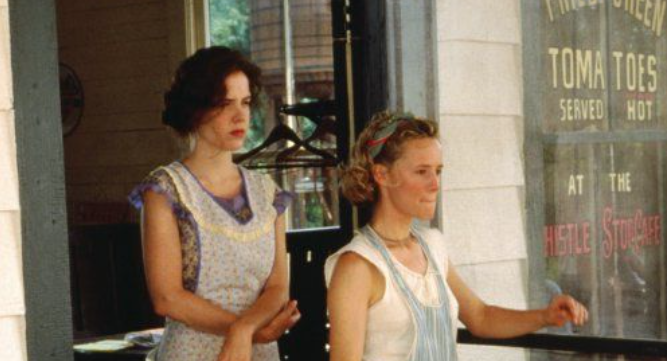
In the world of cinema, food often symbolizes more than just sustenance. In Fried Green Tomatoes, food becomes an emblem of connection, healing, and resilience, particularly through the lens of the Whistle Stop Café. The act of preparing and sharing food is much more than just a daily chore — it’s a means of healing and a powerful tool for emotional and psychological recovery. This dynamic highlights the role food plays not only in survival but also in shaping the bonds that make us whole.
The Whistle Stop Café: A Sanctuary of Comfort
The Whistle Stop Café serves as more than just a diner for the townspeople — it is a sanctuary for those who are struggling, grieving, or looking for solace. From the moment Ruth Jamison and Idgie Threadgoode take over, the café becomes a symbol of refuge, offering both physical nourishment and emotional comfort.
The café is the setting for most of the pivotal moments in the film — it is here that Ruth finds her strength, Idgie finds her home, and the community finds healing. The food they serve is rich with love and care, reflecting the bond between the women and their desire to create something meaningful in a world full of pain.
Fried Green Tomatoes: More Than Just a Dish
The titular fried green tomatoes are perhaps the most iconic dish in the film. While they are a beloved Southern delicacy, they also carry deeper symbolism. Fried green tomatoes are an unusual dish — a humble, hearty meal made from an ingredient that would otherwise be discarded. This parallels Ruth’s own life: she was once discarded and mistreated, but through her connection with Idgie and the café, she finds her worth and is transformed into something beautiful and valuable.
The process of transforming something unripe and overlooked into a delicious meal mirrors Ruth’s own personal transformation. She, too, is transformed from a woman beaten down by an abusive marriage into a woman of strength, independence, and empowerment. Just as the tomatoes are carefully fried and served, Ruth’s journey involves nurturing her own sense of self-worth.

The Healing Power of Food in Relationships
Food in Fried Green Tomatoes is not only about nourishment; it also plays a vital role in forging and deepening relationships. The act of sharing a meal creates intimacy, a moment to connect beyond words. The kitchen becomes a space of communication where silence and understanding flow as easily as the food being prepared.
In particular, the relationship between Ruth and Idgie is marked by moments spent together in the kitchen, preparing meals for the café. Their bond is strengthened through these acts of service, where each dish they serve becomes an extension of their care for one another. Through food, they convey love and solidarity, something that often speaks louder than any words could.
Food as a Symbol of Reconciliation and Transformation
Throughout the film, food also becomes a means of reconciliation. One of the most powerful examples of this is seen in the way the café serves as a place of healing for various characters, such as Evelyn. In a pivotal moment in her own personal growth, Evelyn learns that food isn’t just about consumption — it’s about the deeper emotional and spiritual nourishment it can offer.
When Evelyn begins to visit the café and listens to Ninny’s stories, she not only nourishes her body with the comforting food but also begins to heal emotionally. The act of sharing a meal at the café with Ninny and other townspeople represents a healing journey for Evelyn, who is gradually able to break free from her own feelings of isolation and self-doubt.
Food and Legacy: A Culinary Connection Across Generations
Food also becomes a link between generations, passed down through stories and recipes. The café’s history — and its culinary legacy — is shared through the lives of Ruth and Idgie, as well as Ninny’s storytelling in the present. The dishes served are not only part of the café’s tradition but also reflect the resilience and strength of the women who ran it.
As Evelyn learns about Ruth and Idgie’s lives through Ninny’s tales, she also discovers the healing power of legacy. The food served at the Whistle Stop Café is not just a reminder of the past but also a way of keeping those who came before her alive. Evelyn’s eventual return to the café in the film’s closing scenes is a powerful moment where the food represents a continuity of care, strength, and love, showing how one generation passes down its wisdom and resilience to the next.
Food as a Path to Healing
In Fried Green Tomatoes, food is much more than a means to survive — it is a symbol of resilience, empowerment, and emotional healing. Whether it’s the transforming power of a plate of fried green tomatoes, the shared meals that bind characters together, or the culinary legacy that transcends generations, food becomes a tool for both nourishing the body and the soul.
The film reminds us that, just as food can fill our stomachs, it can also fill the empty spaces inside — offering a sense of comfort, connection, and love when we need it the most. The Whistle Stop Café and its offerings are a testament to the idea that sometimes, the best way to heal is through the act of caring for others and nourishing ourselves.
